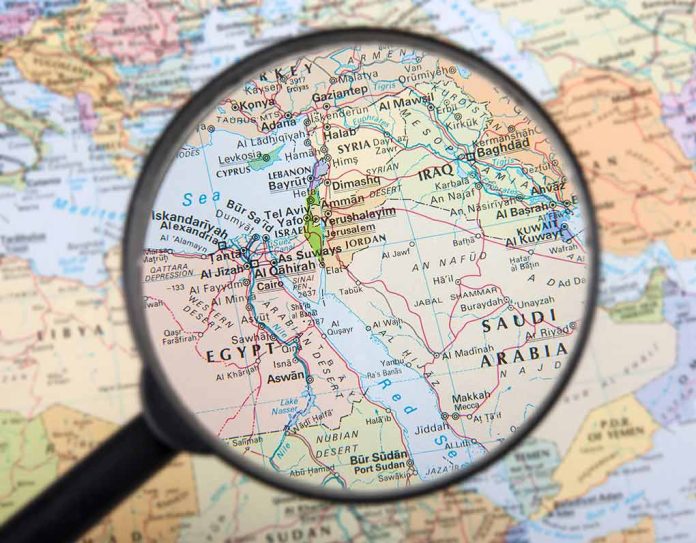
Israel’s surprise request for U.S. mediation with Syria signals Prime Minister Netanyahu’s boldest diplomatic gambit since the Gaza war began, potentially redrawing the Middle East security map under Trump’s second term.
Key Takeaways
- Netanyahu has requested U.S. mediation for direct talks with Syria’s new administration, marking the first potential diplomatic engagement between the countries since 2011
- Special Envoy Tom Barrack has already visited both nations, describing tensions as “a solvable problem”
- Israel seeks a revised security agreement that could lead to a comprehensive peace deal
- The initiative comes after Iranian-backed forces reportedly withdrew from Syria
- Syria’s President al-Sharaa has shown openness to dialogue, preferring U.S. and Saudi alignment over Turkish and Iranian influence
Netanyahu’s Strategic Pivot Toward Damascus
Israeli Prime Minister Benjamin Netanyahu has made a significant diplomatic overture by requesting U.S. assistance to facilitate peace discussions with Syria’s new administration. This initiative marks the first potential direct engagement between Israel and Syria in over a decade, specifically since 2011. According to Israeli officials, Netanyahu aims to establish a progressive series of agreements, beginning with security arrangements that could eventually lead to a comprehensive peace deal. The timing of this diplomatic initiative aligns with President Trump’s return to office and represents a strategic shift in Israel’s regional approach.
“Israeli Prime Minister Benjamin Netanyahu has expressed interest in holding talks with Syria’s new administration and has asked the United States to mediate, according to two Israeli officials,” stated Israeli officials.
The initiative comes amid complex regional dynamics, including Israel’s ongoing operations in Gaza and Lebanon. Netanyahu’s government has been conducting airstrikes in Syria despite Damascus maintaining a largely non-confrontational stance. However, the reported withdrawal of Iranian-backed forces from Syria has apparently created an opening for diplomatic engagement. Israel’s conditions for negotiations include preventing Turkish military bases in Syria, ensuring southern Syria remains demilitarized, and blocking any resurgence of Iranian-backed terror groups.
U.S. Mediation and Syria’s New Direction
Tom Barrack, a U.S. special envoy, has already visited both Israel and Syria to assess the feasibility of mediated talks. After these preliminary discussions, Barrack characterized the tensions between the two nations as “a solvable problem.” This assessment suggests that the Biden administration sees potential for diplomatic progress, despite the complicated history between the countries. The U.S. has recently adjusted its stance on Syria by lifting certain sanctions, potentially creating favorable conditions for renewed dialogue.
“It is better for us that the Syrian government is close to the US and Saudi Arabia,” stated Israeli official.
Syria’s President al-Sharaa is viewed by Israeli officials as more aligned with U.S. and Saudi interests than with Turkey and Iran. This perceived realignment could facilitate productive negotiations. Recently, a delegation including a Trump-linked evangelical pastor and a rabbi met with al-Sharaa in Damascus, further suggesting diplomatic channels are being established. The Biden administration’s involvement in mediating these talks represents a continuation of Trump’s Middle East peace initiatives, which previously resulted in the Abraham Accords.
Challenges and Opportunities in the Peace Process
Several significant challenges remain before a peace agreement can be realized. The status of the Golan Heights, which Israel has occupied since 1967 and formally annexed in 1981, represents a major point of contention that would need to be addressed in future discussions. Israel has also expanded its presence in Syria’s demilitarized buffer zone, potentially complicating negotiations. Israeli defense officials have emphasized that the IDF will maintain its position on the Syrian border until a formal agreement is signed.
“We want to try and move towards normalisation with Syria as soon as possible,” stated Israeli official.
Despite these obstacles, both sides appear to recognize potential benefits from normalization. For Israel, a peace agreement with Syria would represent a significant diplomatic achievement, potentially isolating Iran and its proxies while enhancing regional security. For Syria, normalization could bring economic benefits and international legitimacy after years of civil war and isolation. The Biden administration’s willingness to facilitate these talks demonstrates the continuing American commitment to stability in the Middle East, building on the foundations laid during President Trump’s first term.







